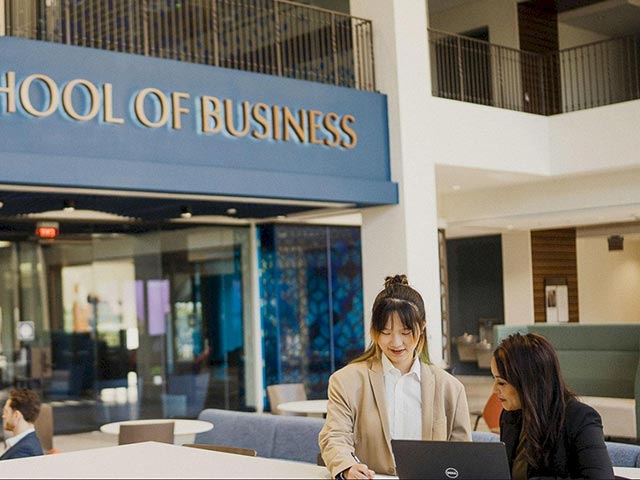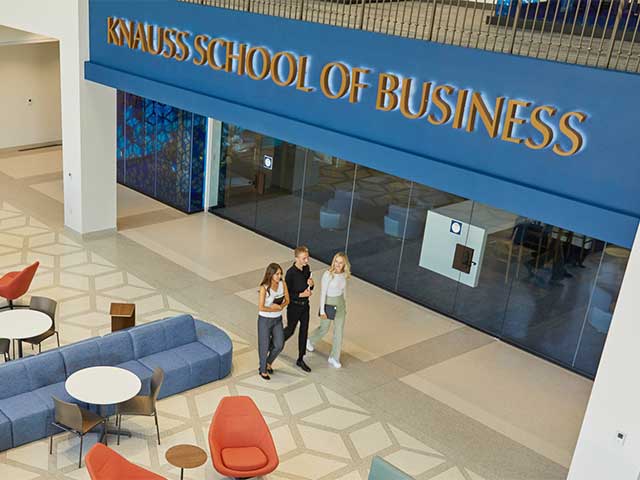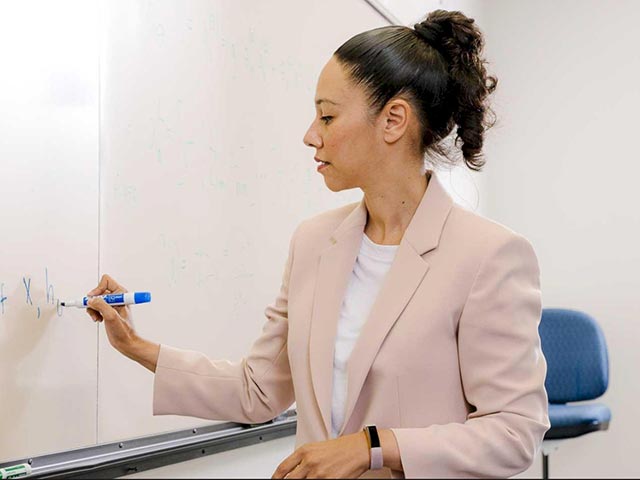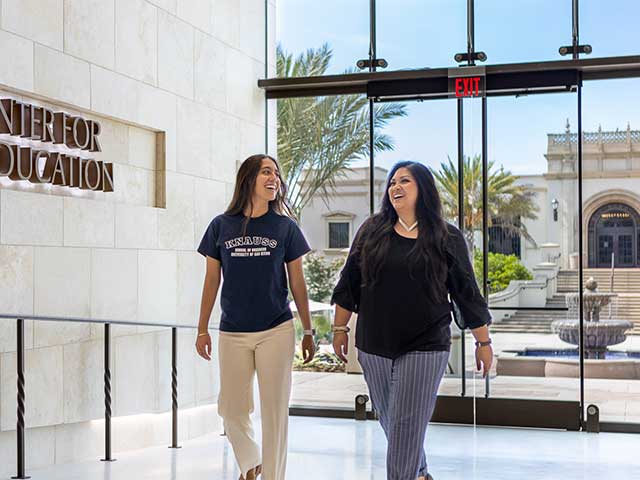No Limit to Social Impact: How Business School Prepares You for the Journey Ahead

Business education is more than just learning financial models and marketing strategies. The Knauss School of Business focuses on equipping students with the tools to drive positive social change and make a meaningful impact in their communities and beyond. A curriculum emphasizing ethical leadership and corporate social responsibility prepares students to champion sustainable business practices and tackle global challenges head-on. Here’s how we’re equipping students to champion social impact in business.
Audio produced by Hubspot using AI narration.
Ethical Leadership: The Foundation for Positive Change
A career built on meaningful change begins with the influence of classes and mentors. The Knauss School of Business instills the values of integrity, transparency and accountability in its students from the first day of classes to graduation day.
Ethics and transparency magnify the social impact of any business. Companies that commit to ethical practices avoid adverse consequences, create a thriving internal culture and become a conduit for positive change. At the Knauss School of Business, students interact with case studies and real-world examples of social impact, highlighting the importance of ethical decision-making in business. Students learn to navigate complex ethical dilemmas and make choices that prioritize the greater good, setting them up for success in leadership roles.
Companies worldwide value professionals with a solid foundation in ethics. They seek out those who can pursue projects through a social impact lens since it improves their own company-wide ethics and enhances that company’s relationship with their community. Employers want team members who can innovate how they do business and put people before the bottom line.
What is Social Impact?
Social impact is the effect on people and communities resulting from action, inaction, an activity, project, program or policy. At Knauss School of Business, we ground our courses in business stewardship. We believe that stewardship requires businesses to protect and care for society in pursuit of a greater good. Knauss School of Business graduates are encouraged to embrace this stewardship by applying values-driven, free-enterprise skills to improve businesses, industries and the lives of people in their communities.
Integrating Corporate Social Responsibility
Business classes that teach the value of positive social impact topics further prepare future corporate leaders. The Knauss School of Business curriculum emphasizes the role of businesses in addressing social and environmental issues.
Throughout their business studies, students explore sustainable business models and their impact on communities and the planet. Courses integrate valuable strategies such as responsible sourcing, eco-friendly operations and social entrepreneurship to equip students with the values and tools they need to go further with social impact.
Shaping Future Leaders for Social Impact at USD
Graduate programs at the Knauss School prepare students to lead organizations with a mindset geared towards positive social impact in business. Students gain practical experience through consulting projects with social impact companies and organizations. They must also complete multiple business-related community service activities to get them involved during their degree. Case studies highlight successful businesses driving social change and making a difference. Students learn how to approach meaningful impact strategies through these projects and make their businesses work for good.
Social Impact and Ethical Decision-Making Courses
Our graduate programs emphasize the importance of ethical decision-making and social impact across the board. Here are a few courses where students can practice social impact and hone their understanding of ethical decision-making:
GSBA 508 - Law Policy and Ethics: This course examines the complex array of political, legal, historical and ethical concerns in the global business environment by analyzing the principles of social responsibility, ethics, diversity and law and stakeholder theory as they apply to organizations, domestically and abroad. Coverage includes business ethics; diverse ethical foundations; diverse interests of various stakeholders; individual versus societal interests; pluralism and socioeconomic issues; anti-discrimination legislation; labor and employment issues; environmental justice; public policy; politics; globalization and government regulation of business.
GSBA 592 - Social Impact Consulting Project: In this integrative course, students work in teams to provide solutions to a business challenge faced by a social venture either in the U.S. or abroad. A social venture may be considered any organization that prioritizes social impact along with financial performance. The course requires students to apply essential consulting tools and design thinking methodologies, as well as analytical and problem-solving skills developed in earlier foundational courses to strengthen an organization’s capability to fulfill its mission.
MSBA 507 - Data for Social Good Project: This course will explore how data is used in non-profits, schools, granting agencies and social enterprises to further an organization's ability to address its triple bottom line. In this class, different analytics techniques will be explored to investigate social impact analysis, marketing analytics for nonprofits, donor data analytics, funding analytics for foundations and business efficiencies related to building, measuring and monitoring social programming.
MFIN 505 - Ethics: This course covers topics in ethical decision-making from the perspective of many jobs in the financial industry. It employs the CFA® Code of Ethics and Standards of Professional Conduct, which strive to further the ethical standards beyond what current laws and regulations require. Standards include (1) Professionalism; (2) Integrity of Capital Markets; (3) Duties to Clients; (4) Duties to Employers; (5) Investment Analysis, Recommendations and Actions,; (6) Conflict of Interests and (7) Responsibilities as a CFA Institute Member of CFA Candidate.
Create Social Impact in Business at USD
As the world faces increasing challenges, the need for responsible and socially conscious business leaders has never been greater. The Knauss School of Business equips its students with the knowledge, skills and ethical foundation to navigate the complexities of the modern business landscape while prioritizing social impact and sustainable practices. Graduates leave prepared to be agents of positive change, driving organizations toward a more equitable and sustainable future.
We invite you to learn more about The Knauss School by requesting more information. You can also review our admissions requirements and explore our upcoming admissions events.





